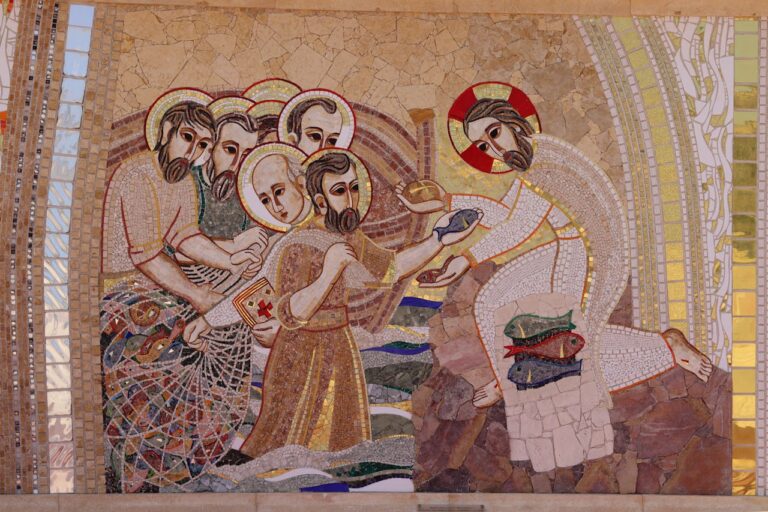When the apostle John was just a small child, he likely made his first pilgrimage to the holy city of Jerusalem with his family. His father Zebedee, his mother Salome, John, and his older brother James all trudge south along the winding road through the Jordan Valley. To avoid crossing through Samaria, they take the traditional longer route to the ancient city of Jericho. From there, they follow the arduous Jericho Road. The dry, rocky, and dangerous road ascends 3,500 feet over 17 miles before arriving at Jerusalem.
It is not hard to imagine the young John, weary and thirsty, asking his parents again and again, “How much farther?” Mile and mile, Zebedee might have answered, “It’s just over the horizon.” Finally, just before the end of the road, the caravan would have topped the ridge of Mount Scopus, singing the Psalms of Ascent joyfully as their destination broke into view. According to Jewish tradition, John would have climbed that ridge singing these words from Psalm 121:
“I lift up my eyes to the mountains—
where does my help come from?
My help comes from the Lord,
the Maker of heaven and earth.”
Fast forward to the very end of John’s life. Now an old man, he has been exiled to a small rocky island in the Aegean Sea. John must be weary from his travels. For decades, he has been treading along the narrow way, the unpopular path of believers in Jesus Christ. Now, he is the last of the apostles still alive.
“For decades, he has been treading along the narrow way, the unpopular path of believers in Jesus Christ.”
Imagine the awful day, decades prior, when a messenger arrived at his door with the news, “Herod has put to death your bother, James.” Sometime later, he would receive word of the deaths of every one of his closest friends: Matthew, Thomas, Bartholomew.…At some point, John must have begun to hate seeing a messenger coming in the distance. John must have been overcome with grief the day he received word from Rome that both Peter and Paul were gone, victims of Roman persecution.
John lived through periods of persecution under both Nero and Domitian. John watched from a distance as the holy city of his childhood, the temple courts where Jesus taught, and the Holy of Holies in which God had dwelled were entirely destroyed by the Romans under Titus. How great the weight of grief as he heard about the thousands of his countrymen slaughtered in the battle. Surely, by now, the journey was wearisome to old John.
Jesus had promised that he would come back “soon.” Just as young John had trudged up that treacherous Jericho Road, wondering if they would ever arrive, old John must be beginning to wonder if the coming Kingdom of God really was just over the horizon. What kind of weight lay on John’s shoulders as he contemplated the end of his life?
“How great the weight of grief as he heard about the thousands of his countrymen slaughtered in the battle.”
Here he was, the last living apostle—did it all rely on him? What would happen to the fledging Christian movement once he was gone? Who would speak with authority into the lives of this rag-tag body of believers once there was no one left who had actually sat at Jesus’ feet? Would the whole thing just fall apart?
It is in this context that John receives an unbelievable gift of grace. Deep in prayer, one day in a rocky grotto on the island of Patmos, the sky splits open and John receives the revelation which would become the final book of the New Testament. As John struggles to see the city of God just beyond the horizon, God opens his eyes to see a big, beautiful vision of what is to come.
“Then I saw ‘a new heaven and a new earth,’ for the first heaven and the first earth had passed away, and there was no longer any sea. I saw the Holy City, the new Jerusalem, coming down out of heaven from God, prepared as a bride beautifully dressed for her husband. And I heard a loud voice from the throne saying, ‘Look! God’s dwelling place is now among the people, and he will dwell with them. They will be his people, and God himself will be with them and be their God.’ He will wipe every tear from their eyes. There will be no more death or mourning or crying or pain, for the old order of things has passed away.’ He who was seated on the throne said, ‘I am making everything new!’” (Revelation 21:1-5a, NIV)
God reminded John that the vision of his kingdom is coming. It is worth living for. It is worth dying for.
“God reminded John that the vision of his kingdom is coming. It is worth living for. It is worth dying for.”
Yes, right now, the road is hard.
Yes, right now, the world is not what God wants it to be.
Yes, there will be bloodshed, tears cried, and fingers worked to the bone…
But the full-circle moment, the moment no one can possibly imagine—it is coming. A new heaven and a new earth are just over the horizon.
I have been there, have you? The trials of this life have worn me out. I have been discouraged by fighting within the church. I have grown tired of striving against sin. I have wondered what Jesus meant by “soon.” But John’s life reminds me that the kingdom is coming. The road is worth traveling. The King is coming back. The new Jerusalem is just over the horizon.
And so, maybe I will just stand, just a moment, on this ridge and echo the words of the psalmist that young John would have sung so many years ago.
“I lift up my eyes to the mountains—
where does my help come from?
My help comes from the Lord,
the Maker of heaven and earth.”











